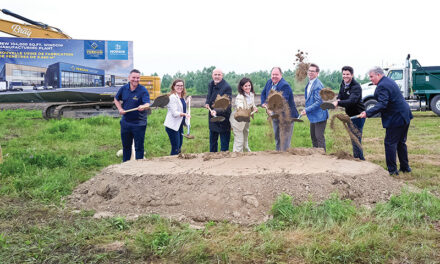WINCHESTER – The extraordinary growth in North Dundas has created opportunities and challenges for the North Dundas council.
Among the many growth related issues that the council has had to deal with over the past year, development charges has been one of the more interesting ones.
Development charges are what developers have to pay to any municipality when they build homes that are going to impact on the municipality’s services. The actual charge is worked out by the council.
Water and sewer development charges, for example, have to be paid to the municipality by a developer to help cover the cost of adding more people to an existing community; services like water lines that have to be brought to a house and sewer lines that have to be extended to a subdivision.
By law, a municipality’s development charges have to be reviewed every five years and for North Dundas, faced with all that growth the timing for a development charge review is perfect.
The council listened to a presentation by Sean-Michael Steven of Watson & Associates Economist Ltd.
Steven explained that the idea behind the charges was, “To recover the capital costs associated with residential and nonresidential growth within a municipality
The capital costs are in addition to what costs would normally be constructed as part of a subdivision (i.e. internal roads, sewers, Water mains, roads, sidewalks, streetlights, etc.)”.
The presentation featured a step-by-step process that is considered when reviewing the charges.
The review process begins with a forecast about how much growth a municipality will be experiencing.
Next a municipality has to look at the question of whether there has been an increase in a need for a particular service. For example do you need to find funding for an increase in what a fire department is expected to have to do more of, as a result of more growth, and if so, then development charges could help cover part of the cost for increasing a fire service equipment or staff. In the case of North Dundas fire services, currently there has not been any suggestion that local fire services have experienced an increase in the need for service.
At some point calculations about how to arrive at a particular development charge are made and policies are suggested. Finally a council will have to make a decision on each of the suggested development charges and what they need to be.
The director of planning building and bylaw Enforcement for North Dundas, Calvin Pol said, “We have had development charges here since even before amalgamation.”
Pol explained that the purpose of the presentation was to give all of the councillors a chance to become familiar with the development charge review process.
Pol said, “You look where you are going with development and then look at where you collect back from development to cover off your growth related costs.”
He added that there will be recommendations made about what the charges should be, and then there will be a public meeting and then the council will decide where the charges will end up.
The public meeting is expected to take place on Dec. 14 in the council chambers.
“From that meeting, we will get public input and then we will meet with council in January and council can then decide where it wants to see development charges,” he said.

Joseph Morin is the Editor of the Eastern Ontario AgriNews, and the Record. He is, despite years of practice, determined to eventually play the guitar properly. He has served the Eastern Ontario community as a news editor, and journalist for the past 25 years with the Iroquois Chieftain, Kemptville Advance, West Carleton Review, and Ottawa Carleton Review in Manotick. He has never met a book he did not like.










